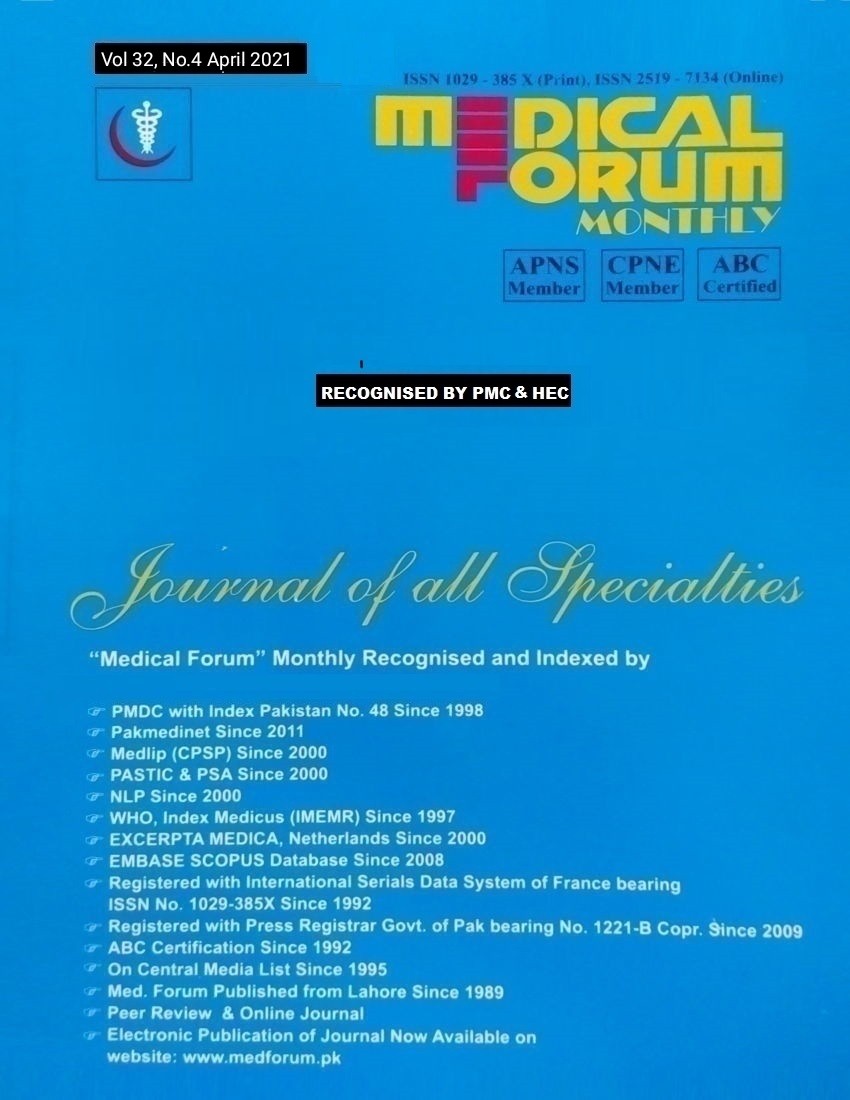
39. Role of Antibiotics in Raised Serum Prostate Specific Antigen (PSA) Level in KPK
Objective: To study the Role of antibiotics in raised serum prostate specific antigen (PSA) Level in Pakistan.
Study Design: Prospective study
Place and Duration of Study: This study was conducted at the Urology Department Ayub Teaching Hospital Abbottabad, Idris Teaching Hospital Sialkot during Feb, 2019 to Feb, 2020.
Materials and Methods: Total 100 male patients with serum PSA level between 4ng/ml to 10ng/ml were enrolled in this study. Patient ages were 50 to 80 years. Detailed history including Diabetes Mellitus & hypertension,physical examination including height (m2) weight (kg) blood pressure, fasting & random blood sugar readings & digital rectal examination (DRE) will be performed after taking informed written consent. Patients will positive transrectal Ultrasonography (TRUS) guided biopsy for carcinoma prostate & patients with urinary retention assessed on Ultrasonography (having more than 400ml urine in the bladder) and need catheterization to relieve the urinary retention were excluded. Urine was collected for routine examination, culture & sensitivity (C/S) after prostatic massage. The sample for serum prostate serum antigen (PSA) was collected before digital rectal examination (DRE) and was analyzed by enzyme-linked immune sorbent assay (ELISA) technique. Tablet ciprofloxacin 500 mg I per oral at interval of 12 hours was given for four weeks. Serum prostate serum antigen (PSA) was repeated after completion of four weeks of antibiotic therapy. Statistics software SPSS-16 was used for data analysis. Mean & standard deviation was computed for quantitative variable i.e. age and serum PSA level pre and post treatment. Mean change in PSA level after the treatment was described in terms of percentage also. Paired samples T test was applied to see the statistic significance of any difference between pre and post treatment PSA levels. Outcome variable .i.e. change in PSA was stratified among age to know the effect modification.
Results: One hundred patients presenting with mild Lower urinary tract symptoms (LUTS) and prostate serum antigen (PSA) level between 4-10 ng/ml took part in the study. After a 4 week antibiotic administration serum PSA level were re-assessed. Mean standard deviation, minimum and maximum values of the variables i.e. age, International Prostate Symptom Score (IPSS), pre and post treatment PSA levels, as well as change in PSA after the treatment presented in the table no 1 Mean change in serum PSA level after the treatment was 3.82 which show a 46.58% improvement. Paired samples t test was used to identify the significance of any difference between the pre and post treatment serum PSA levels. Pvalue =0.001 i.e. showing a statistically significant difference after the treatment as shown in table no 2 39 (39%) patients had their post treatment (Rx) PSA improved in the range of 1-3 whereas 61(61%) patients had an improvement in PSA in the range of 4-7 after the treatment.
Conclusion: Antibiotic treatment is clinically beneficial in patients with high prostate serum antigen levels. Prostate serum antigen reduction or normalization after medical treatment, either antibiotic and/or non steroid anti inflammatory drugs, for ≥2 weeks can avoid unnecessary prostate treatment. Antibiotic treatment is more beneficial when the prostate serum antigen level is <20 ng/mL, especially when the evidence for inflammation is not overt.
Key Words: Antibiotics, Serum, Prostate Specific Antigen (PSA)
Citation of article: Hayat N, Fiaz S, Ashraf H, Shahab M, Azhar K, Khan T. Role of Antibiotics in Raised Serum Prostate Specific Antigen (PSA) Level in KPK. Med Forum 2021;32(4):157-160.
